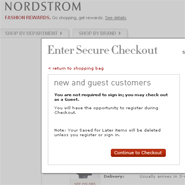- About
- Subscribe Now
- New York,
October 19, 2011

NEW YORK – Increased usage of technology should lead brands to shape the way that they handle, share and protect consumer data, especially with the emergence of consumers who want to know how their data is handled in digital channels, according to a study from McCann Worldwide released yesterday.
The No. 1 fear of current consumers is the erosion of their personal privacy. However, the participants of the study were broken into five profiles of the current consumer that display just how much consumers are willing to share with brands, and how marketers can tap each market.
“Privacy is a really interesting balance between security and sharing,” said Laura Simpson, London-based global IQ director at McCann Worldgroup. “It surprised us, in that erosion of personal privacy is more worrisome for consumers around the world more so than climate change and increased levels of terrorism.
“They were more worried only about the further global financial crisis,” she said. “It’s an important point of view of what is compelling and how consumers care about [privacy].
“We have to unpack that word and understand all of the different things that sit under that title.”
The McCann study, “The Truth About Privacy,” was released yesterday at the Cipriani on Wall Street restaurant in New York.
Approximately 6,525 consumers were surveyed from the United States, Britain, Chile, India, Hong Kong and Japan.
Specific data on correlations between consumers’ wealth and their security comforts were not available before press deadline.
Tech-savvy shoppers
The most common shopper – and the most beneficial toward brands – is the "savvy shopper." This consumer is approximately 37 percent of the global population.
This shopper embodies data trade-offs necessary in the new world of sharing. That is, these consumers are willing to share personal data if they know what is in it for them.
The savvy shopper mainly wants safeguards such as security certificates and to receive something such as a discount or a special promotion in exchange for data.
The second most-common type of shopper is the "sunny sharer" at 20 percent of global consumers.
This group is optimistic about sharing, but are mindful about sharing information online that could damage their finances or reputation.
Another group of consumers is the most private. The "walled worriers" make up 19 percent of the population and are the most sensitive to perceived invasions of privacy.
This group needs constant reassurances that data collection will not be shared with third-party sources.
The fourth-most common shopper is the "eager extrovert."
These shoppers, who make up 15 percent of the population, are the most eager to share personal information. However, this may have repercussions as their over-sharing may lead to a sour reputation among friends, partners or employers, according to McCann.
The smallest group of consumers are the "cautious communicators," and they make up 9 percent of the global population.
This group is not as worried about financial or reputational damage, but rather is annoyed when brands constantly bombard them with messages.
Therefore, cautious communicators are less likely to sign up for branded newsletters and offers.
Four C's
Brands looking to collect consumer data therefore must rely on what McCann calls the Four C’s of Trust.
The first C is control. Brands have to be completely transparent when telling consumers what will happen to their data when they hand it over to the brand.
Approximately 49 percent of those surveyed think it is very important to have this kind of control, including what kind of data and when they can share it.
The second C is Choice. Approximately 51 percent of global consumers want a choice in how their data will be used.
The third C is commitment. It is very important that consumers hear from companies that their data will not be passed on to third parties.
Fifty-five percent of consumers worldwide name commitment as one of the top three choices when deciding whether or not to trust a brand.
The last C is compensation. Consumers will share data when they understand if and how it will benefit them.
Since many affluent consumers do not care about discounts or price points, luxury brands may need to offer special experiences or exclusive offers that consumers cannot get elsewhere.
In fact, 31 percent of consumers say that this is a top criterion for sharing data.
“Many consumers say that privacy is a two-way street,” Ms. Simpson said. “They are willing to share data as long as they know what’s in it for them.”
Final Take
Rachel Lamb, associate reporter on Luxury Daily, New York
Share your thoughts. Click here